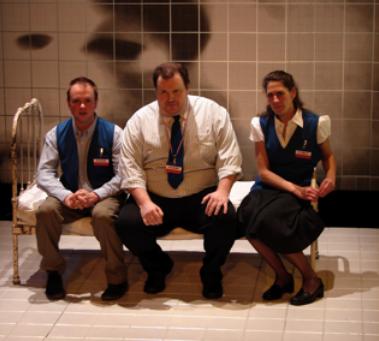Celebrity comes in many different forms. Olivier Choinière’s Bliss weaves parallel stories of two famous Quebeckers: pop diva Céline Dion and Isabelle Côté, the 22-year-old who made national headlines in 2002 when her father and older brothers were charged with holding her prisoner and violently sexually abusing her over a 17-year period.
“The play has a different resonance in Toronto because Céline is known in practically every country on earth, while Côté is much more famous in Quebec,” says director Steven McCarthy. “Every culture has their own celebrities that don’t exist anywhere else. Because Quebec is this tiny French island in the giant English sea of North America, they have their own independent star system and tabloids to match.”
First staged as Félicité in Montreal in 2007, the English translation received its inaugural Toronto production under McCarthy’s watch at SummerWorks in 2010. Remounted as part of Buddies’ season, the production is staged on a 12-foot square of white ceramic tiles where four Walmart employees of varying seniority recount the stories. Reminiscent of classical Greek tragedy, the actors describe the horrific events in lieu of playing them out. Drawing unlikely comparisons between a pop star’s glamorous life and the terrifying realities of abuse, the play exposes the dark side of our culture’s insatiable appetite for the private lives of celebrities.
“There was a time when you could pick up a tabloid in Quebec every day and read stories about the two of them on the same page,” McCarthy says. “I’m thinking of the play as a piece about gods and monsters. Céline, as a celebrity and ambassador for the people of Quebec, has godlike status, while Isabelle represents the most unfortunate among us.”
McCarthy first stumbled on the work in 2010 while he was a directing student at Montreal’s National Theatre School. He’d been on the hunt for a play to stage as his final project and knew he wanted to work with a hybrid of Quebec and anglo-Canadian culture.
“I went to French school growing up, so I’m sensitive to the need to bridge the gap between French and English Canada,” the Sault Ste Marie native says.
Though he admits he wasn’t a fan of Dion’s music prior to working on the show, the process led him to an unlikely admiration for Charlemagne’s number-one chanteuse.
“I read a lot of stuff about her while I was researching the play, and I feel like it really shifted my experience of what taste is,” he says. “I started to think of her as a heavy-metal singer working in pop. Her music is all about power and pure emotion, with no room for subtlety or misunderstanding.”
He also sees Dion’s ability to stay true to her roots as key to her success. As the top-selling Canadian artist of all time, she has reached the rest of Canada and every corner of the world with her craft, without losing a shred of her Quebec identity.
“She’s a celebrity in virtually every culture on Earth, but she’s totally rooted in her own culture,” McCarthy says. “Usually in order to transcend borders, a person’s culture is whitewashed from them. But with Céline her Quebec-ness is a huge part of what’s made her successful because it makes her seem accessible and real.”


 Why you can trust Xtra
Why you can trust Xtra


